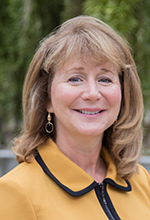Jennifer Sinclair Curtis
Distinguished Professor of Chemical Engineering and Dean, College of Engineering, UNIVERSITY OF CALIFORNIA, DAVIS
BSChE 1983
For momentous research contributions in the development and validation of numerical models for the prediction of particle flow phenomena, with applications ranging from debris flows and sediments, food processing, pharmaceutical manufacturing, and the aerospace, energy and mining industries.
As a Purdue undergraduate, Jennifer Sinclair Curtis pursued her budding fascination for problems never before studied. That fascination flourished, ultimately leading to a prolific career in research and prominent leadership positions in academe.
Now a distinguished chemical engineering professor and dean of the College of Engineering at the University of California, Davis, Curtis oversees eight academic departments with 230 engineering faculty. Student enrollment in the college exceeds 4,600 undergraduates, 400 master’s students and 760 PhD students.
Among her most notable research achievements, Curtis is credited with models of particulate flow that have been adopted extensively in commercial and open-source computational fluid dynamics software code. She also was the first to partner with ANSYS Fluent to expand the multi-phase simulation capability of that code, which is now used by 96 of the world’s 100 biggest industrial companies and by over 40,000 customers.
With more than 30 years to reflect on, since her time as an undergraduate, Curtis says Purdue proved to be the right place to start her journey: “Certainly the Midwestern work ethic that is so evident at Purdue is a great preparation for any profession. I felt very well prepared for the graduate courses at Princeton, and I was able to effectively compete with my fellow graduate student classmates who all came from top chemical engineering programs across the country.”
Curtis says Purdue’s demanding engineering curriculum helped her learn how to organize and prioritize her time. “Our professors taught us how to frame problems and to systematically solve them,” she says. “I also had my first research experience at Purdue, and through that, I learned to investigate problems that no one had ever studied before.”
As well as her experience engaging in undergraduate research, Curtis cites a work-study job as being instrumental in her choice of career. “I served as a grader and recitation leader for algebra (MA 153),” she says. “While walking back to my dorm from one of the algebra recitation sessions, it dawned on me that I enjoyed both research and teaching others, and that perhaps I should be a university professor!”
To current students who may get disheartened by a bad grade and be tempted to give up, Curtis says: “You may not like or do well in every one of your engineering or science courses, but that definitely does not mean you should not be an engineer.”
Trust in the Lord with all your heart and lean not on your own understanding; in all your ways submit to him and he will make your paths straight.”Proverbs 3:5-6
Career Highlights
| 2015-present | Distinguished Professor of Chemical Engineering and Dean, College of Engineering, University of California, Davis |
|---|---|
| 2012-2015 | Associate Dean for Research and Facilities, College of Engineering, University of Florida |
| 2013-2015 | Director, Florida Energy Systems Consortium |
| 2005-2009 | Chair, Department of Chemical Engineering, University of Florida |
| 2000-2003 | Head, Department of Freshman Engineering, Purdue University |
| 2002-2003 | Associate Dean of Engineering, Purdue University |
Education
| 1983 | BSChE, Purdue University |
|---|---|
| 1985 | MSChE, Princeton University |
| 1989 | PhD ChE, Princeton University |

